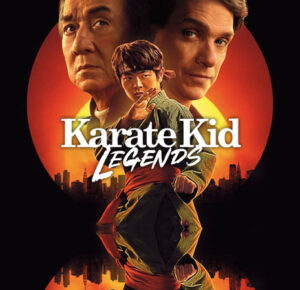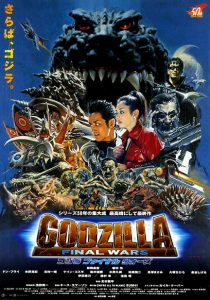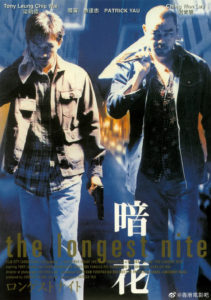
“A Hero Never Dies” Chinese Theatrical Poster
Director: Johnnie To
Cast: Leon Lai Ming, Lau Ching-Wan, Fiona Leung Ngai-Ling, Yoyo Mung Ka-Wai, Henry Fong Ping, Yam Saikoon, Keiji Sato, Michael Lam Wai-Leung, Yen Shi Kwan, Lam Suet, Yuen Bun, Philip Keung Hiu-Man
Running Time: 98 min.
By Numskull
When are people gonna learn that crime doesn’t pay unless you’re O.J. Simpson?
In this corner, we have Jack, devoted servant of Mr. Yam, a gang lord who consults an elderly fortune teller for advice. And in THIS corner, we have Martin, devoted servant of Mr. Fong, another gang lord who also consults an elderly fortune teller for advice.
Jack and Martin, Martin and Jack. They drink in the same bar, they piss on the same trees, and they share a deep mutual respect and a friendship so twisted it hardly qualifies as “friendship” at all.
The source of the tension, of course, is the fact that they work for opposing gangs. One of these days, they figure, one of them is gonna have to put seventeen and a half bullets in the other. No hard feelings, eh? But when a clash between the two factions leaves Martin crippled and both men abandoned by their bosses, they turn their focus to getting some payback.
All in all, A Hero Never Dies is one of the most emotionally hard-hitting HK movies I’ve come across. Every reaction that the story elicits from the viewer…from the desire to send Fong and Yam (especially Fong) kicking and screaming into Hell to the sad respect for Fiona’s dog-like devotion to the wheelchair-bound Martin to the satisfaction of seeing the cane-wielding, whack-happy fortune teller get shot in the foot…is genuine and understandable, if unrealistic.
The film is also full of some striking images which remain in your mind’s eye after the movie ends. The bottle of wine with Jack’s name on it, waiting patiently (if an inanimate object can be said to do such a thing) on a shelf. Jack’s girlfriend’s scarred face after being burned by a pair of hitmen. Fiona, forced to sell her sex for passage back to Hong Kong. And most of all, Martin’s motionless body slumped in his wheelchair, casually rolling through a heated shootout with havoc being wrought on all sides. This isn’t a movie that you just walk away from, saying “Hey, that was pretty good” or “Hey, that was even better than a blow job” or “Hey, that really sucked, I should have watched some Mad About You reruns instead.”
It can be disarming at first; there’s some humor (half-way decent humor, mind you) near the beginning, but it’s nowhere to be found once the characters are established. Jack and Martin threatening each other over the phone through a tired old man is fun, and the glass-breaking scene in the bar is one of the best. There ain’t much else to laugh at, though, nor should there be. Life’s a bitch and then you die. It’s a fact that this movie conveys pretty well.
The biggest fault that AHND has is its ending, which is a little weak only by comparison to the rest of it. I won’t say it’s “formulaic in the extreme” or “more predictable than a teen slasher flick” but, when the film reaches a certain point, there’s only one direction that the story can credibly take. If you’ve seen more than a small handful of HK films, you’ll no doubt be unsurprised by the finale. That doesn’t make it a bad ending, though.
Good acting all around and a very fitting musical score, as well. Never did I get the impression that any aspect of AHND was rushed or done with half an ass.
Good story, good acting, good music, good movie. Not much else to say. Stick a fork in me, I’m done.
Numskull’s Rating: 8/10
By Equinox21
I don’t know what I was thinking the first time I watched this movie, because I didn’t think much of it. But, when I watched it for the second time a year later it struck me as being a brilliant film and one of Johnny To’s best. It’s a story of rivalry and friendship, betrayal and justice.
Martin (Lau Ching-Wan) and Jack (Leon Lai) share a unique friendship. They don’t necessarily get along, but they seem to have an unspoken respect for one another. Each is their own Triad boss’ right hand man, because they are smart, loyal and as good as it gets doing what they do. When Jack and his gang protect their boss, Mr. Yam, from Martin and his gang, it leaves all but Yam, Jack and Martin deadŠ with the latter two full of bullets and near death. After this bloody confrontation between the two gangs, The General orders the two opposing bosses to go back to the way things were a year before. They agree, and form a new gang, with both bosses in charge. Unfortunately, Jack and Martin are no longer needed, and are ignored and left to rot in the hospital and then on the streets with no jobs, Martin with no legs, and eventually with both their women dead. But, can their friendship be enough to get them the justice they deserve?
The acting on all fronts was quite good. Lau Ching-Wan and Leon Lai were perfectly cast in the leads, each displaying perfect arrogant, steely attitudes. Martin dresses almost like a cowboy/pimp, with a wild cowboy hat and boots. I’m not sure anyone BUT Lau Ching-Wan could have pulled this off without being laughed at. He really is to Johnny To what Chow Yun-Fat is to John Woo.
There were a few scenes that I didn’t care for tremendously. One such scene was a shootout on a dark bridge, and this was because the only lighting in the entire scene came from the headlights of the cars on the bridge. It was just a little too dark to see what was happening. Another was in a bar, which plays an important role in their friendship, where Martin and Jack are shattering each other’s wine glasses with a coin. It was a little far fetched, however the important part was really the back and forth challenging of the two characters which displayed the friendship/rivalry perfectly.
The action scenes were, however, all really well done; lots of shootouts, lots of bullets, lots of bodies. This movie is the epitome of a heroic bloodshed or a bullet ballet movie.
Any fans of good movies about friendship or movies with lots of action should love this one. Do yourself a favor and check it out.
Equinox21’s Rating: 9/10
By Alexander
Overrated.
How else to explain the absolutely glowing praise heaped upon this ugly monster of a film by past reviewers on this website?
How else to explain this nugget by James H.: “…very few films…can exude as much style and grace as ‘A Hero Never Dies’.
Or this, from the esteemed MPM: “Johnnie To’s masterpiece.”
And this, from our Ron Jeremy of reviewers, Numskull: “One of the most emotionally hard hitting HK movies I’ve come across.”
From Joe909: “…a classic story along the lines of The Killer.”
From Woody: “…had me on the verge of honest to Gawd tears.”
And finally, Tequila: “Wow.”
The effusive hyperbole spewed by trusted City on Fire reviewers — who also give this film a bloated average rating of 9.3 — is mind-boggling considering A Hero Never Dies is, at best, a mildly entertaining diversion cursed with one of the worst endings EVER. I’m not going to spoil the final act for the handful of people who haven’t seen it, but I would have been less disappointed had a herd of cartoon rabbits been shot out of Lau Ching Wan’s gun and danced across the screen singing “Ice, Ice Baby” in Cantonese.
I’ve seen this film twice, thinking I’d missed something the first time. Unfortunately, the second time around simply afforded me more opportunities to shake my head at ridiculous scenes like the male-bonding-by-pissing-on-tree bit. I WAS initially impressed by the film’s visuals and Johnnie To’s direction. Leon Lai is impressive and proves he’s one of Hong Kong’s most versatile actors (his Comrades, Almost a Love Story shouldn’t be missed). The renowned bar sequence is also enjoyable. BUT, I could not get over…
…Lau Ching Wan’s ridiculous cowboy/low-rent pimp get-up. There is nothing cool about his pencil thin mustache and wide-brimmed hat. If you want to see Lau Ching Wan at his coolest, watch Longest Nite instead. The only thing missing were a white pair of leather chaps and a diamond-encrusted pinky ring.
…”Sukiyaki”. Woody earnestly recited a snippet of this song in his review. That’s cool and all, but it seems as if Hong Kong film fans generally make too big a deal out of hearing a familiar tune in an Asian film (see also Chungking Express). It’s like, “Hey, I can’t understand a word these people are saying and the subtitles are blurry but I DO recognize that song. Cool!”
…the ending. See paragraph one.
…Fiona Leung’s character was once praised on this very site as being an example of a strong female lead with a heart of gold hidden beneath a tough exterior. Bullshit. She spends the first half of the film convincing Yo Yo Mung’s character to be totally subservient to her boyfriend and even gives her tips on how to better please her man.
…the tired male bonding bits ubiquitous to the heroic bloodshed genre.
…the ending. Oops. Said that already.
I’m still confused as to the appeal of the film. Sure, by Hong Kong standards it’s pretty decent, but I don’t think it quite deserves the praise bestowed on it by our reviewers. If you haven’t seen it, give it a shot and let us know what you think. I can’t be the only one who thinks this movie is overhyped and, ultimately, overrated.
Alexander’s Rating: 5.5/10
By Woody
I’ll keep this review short and to the point. See this movie. It is without a doubt one of the best HK action films made in the 90’s. I don’t get all teary eyed over movies…alright, that’s a lie. I always get teary eyed over movies, but that is just because I watch a lot of depressing shit. This, though, had me on the verge of honest to Gawd tears.
This is basically a 1998 retread of John Woo’s classic A Better Tomorrow. It’s got the crippled hero, the overwrought (yet ,oh so great) music, the mythic characters, and the performance of a lifetime. In A Better Tomorrow it was Chow Yun Fat. The torch has now been passed on to Lau Ching Wan, whose performance here is not brilliant, but F*CKING brilliant. That big empty void Chow left when he came to the States has now been filled.
Unlike Woo’s film, this thankfully has some strong female characters, too, the strongest being Fiona Leung. Her performance was also really great here, and the image of her whoring herself to get money for a ticket back to Hong Kong for her and Lau is one of the most depressing and memorable I have ever seen.
There are flaws, but who cares? Everything else in the movie more that makes up for that. The ending, the music, the acting…it’s all great. I don’t know how Johnny To does it. Maybe I don’t want to know. Another classic film from Johnny To. Oh yeah…if you like the song “Sukiyaki”, this is the movie for you!
“It’s all because of you, I’m feeling sad and blue You went away, Now my life is just a rainy day and I love you so, How much you’ll never know…You’ve gone away and left me lonely.”
Woody’s Rating: 10/10
By Joe909
I’m sure this movie was produced with the intention that it would be a tribute to the Heroic Bloodshed films of a decade ago. But instead of coming off as a tribute, A Hero Never Dies is just as great and timeless at the films it pays homage to. The plot is recounted in-depth elsewhere, so I will just offer a few comments on what I liked and disliked about the movie.
As for likes: well, basically everything. Acting, directing, writing, action scenes; everything was exceptional. This was the first Leon Lai movie I’ve seen, and he’s one cool bastard throughout. Lau Ching-Wan, of course, is as consistent as ever in his performance. The gunfights are a good mixture of Ringo Lam realism and over-the-top John Wooery. The end setpiece especially smacks of Woo, in which Lai takes more bullets than Toshiro Mifune took arrows in Throne of Blood, and keeps on walking. Johnnie To uses some interesting film tricks, such as glossing color. On certain shots there almost seems to be a fingerprint on the camera lens, smudging the actor’s faces. A filmic trick that some might find distracting, but here it was used in moderation, and only served to heighten the mythic aspect of the characters.
The film isn’t without flaws, though. Something bothered me throughout the movie’s second act, and it wasn’t until after the film was over that I realized what it was. It’s a typical problem in modern-day HK cinema: lack of a good Villain. Heroic bloodshed flicks are so good at giving us anti-heroes that they sometimes fail to give us a villain we really want to see those anti-heroes annihilate: I’d say this is one small area in which Hollywood action movies are superior to Hong Kong’s ? Hollywood is always sure to give us a memorable and hateable villain, who is known (and hated) from the opening act. A Hero Never Dies (like the Blood Rules, etc) suffers from this problem: the Villain is not introduced as a villain until well into the Second Act, and his appearance as such seems forced.
Let me elaborate. Jack protects his boss Yam. Martin protects his boss Fong. In the opening half of the movie, both bosses are portrayed as kind benefactors. Yam doesn’t even really get pissed off at Jack for shooting his fortune teller in the foot! Add to this the fact that Yam comes off as a very nervous, indecisive, snivelling rat, who seems to look up to Jack as his prime guardian. Martin’s boss, Fong, is barely developed at all: he only gets two scenes in the first act, one in which he appeals to Martin to kill Yam (and this scene is robbed of any “evilness” on Fong’s part when he looks eagerly in Martin’s van for the hookers), and another scene where he stumbles into the General’s office and happily makes up with Yam. Then only a few scenes later he’s beating his subordinates, shooting Martin’s girlfriend, and in general being a world-class prick. Same goes for Yam, who apparently sends some heavies to take out Jack in the hospital, and leaves the widows of his dead guardians with nothing but a few small bundles of cash and a good smack to the face.
The problem is, when Yam and Fong betray Jack and Martin and become the villains of the piece, it just comes off to forced, especially when compared with how the bosses were portrayed in the opening. Maybe by having them act a little more cruelly (or at least, in Yam’s case, a little less uncertain), we could buy the whole betrayal bit.
As it is, though, Jack and Martin’s eventual revenge doesn’t lack any power due to this. I’ve always liked the song “Sukiyaki,” and now I’ll never hear it the same way again: I’ll always think of Jack, finally back from Thailand, striding purposefully into the Saxophone bar, or Jack assisting Martin in his final vengeance upon Fong. This is a great film, and certainly a classic along the lines of the Killer and A Better Tomorrow.
Joe909’s Rating: 10/10
By Tequila
A Hero Never Dies. Wow. I’m not going to explain the plot as Numskull did already, I’m just going to give a rundown on how good this film really is and that.
I thought that this was just going to be another run of the mill gun film, and I expected the acting to be great from Lau Ching-Wan and average from Leon Lai, with great cinematography and direction (it’s a Milkyway film) and nothing really to write home about.
Man was I wrong…Comparing this to The Killer or A Better Tomorrow is like comparing hentai to Garfield – they share a genre and that is all. The only ways they are similar is the use of akimbo handguns and sniper rifle scope cams. The gunfights are just so original, like the finale with Lau Ching-Wan offing triads from a wheelchair or Leon Lai shooting through the roof, resulting in blood dripping down through the ceiling and they add a new dimension to the regular gunplay.
The style of AHND is amazing, Lau Ching-Wan is the only man I know who can make a legless, emasculated shell cool – even with the cowboy hat. There are no bad performances; everybody is excellent, my personal favorites were Lau and Fiona Leung as his girlfriend. The opening bar scene was fantastic and totally bizarre.
All in all, AHND is one of my favorite Hong Kong movies, the only thing I can think of that would improve it is Chow Yun Fat instead of Leon Lai, but only because he’s just so much cooler. Lai doesn’t have that ‘look’, Chow would have rocked that opening bar scene.
Tequila’s Rating: 10/10 – Fantastic!























Be the 1st to Comment